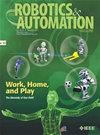海洋机器人:从实验室到真正的水下探险 [特邀编辑的话]
IF 5.4
3区 计算机科学
Q1 AUTOMATION & CONTROL SYSTEMS
引用次数: 0
摘要
在我们不断探索和开发海洋的过程中,海洋机器人是我们进入海洋环境的有力工具,有时海洋环境对人类来说非常恶劣,甚至过于危险。早期的海洋机器人在人类监督下行动,执行预先编程的任务或在训练有素的专家控制下工作。近年来,随着硬件和软件的进步,海洋机器人开始具备自主感知和适应错综复杂的海洋环境的能力,从而更高效、更智能地工作。通过整合近年来的科技进步,从仿生技术和新材料到先进的人工智能方法,海洋机器人有可能在探索海洋环境方面发挥更强大的作用,并为更广泛的任务提供便利,例如在自然栖息地研究海洋生物或在深海进行检查和灵巧操作。本文章由计算机程序翻译,如有差异,请以英文原文为准。
Marine Robots: From Laboratories to the Real Underwater Adventure [From the Guest Editors]
In our continuous exploration and exploitation of the ocean, marine robots are powerful tools for accessing oceanic environments that are sometimes harsh or even too dangerous for humans. Early marine robots acted under human supervision, executing preprogrammed tasks or working under the control of highly trained specialists. In recent years, with the advancements in hardware and software, marine robots have begun to possess the capability to autonomously sense and adapt to the intricate ocean environment, thus working more efficiently and intelligently. By integrating recent advances in science and technology, ranging from biomimetic technology and new materials to advanced artificial intelligence methods, marine robots have the potential to be more powerful in the exploration of the ocean environment and facilitating a broader spectrum of tasks, such as studying marine life in their natural habitats or performing inspections and dexterous manipulation in the deep sea.
求助全文
通过发布文献求助,成功后即可免费获取论文全文。
去求助
来源期刊

IEEE Robotics & Automation Magazine
工程技术-机器人学
CiteScore
8.80
自引率
1.80%
发文量
100
审稿时长
>12 weeks
期刊介绍:
IEEE Robotics & Automation Magazine is a unique technology publication which is peer-reviewed, readable and substantive. The Magazine is a forum for articles which fall between the academic and theoretical orientation of scholarly journals and vendor sponsored trade publications. IEEE Transactions on Robotics and IEEE Transactions on Automation Science and Engineering publish advances in theory and experiment that underpin the science of robotics and automation. The Magazine complements these publications and seeks to present new scientific results to the practicing engineer through a focus on working systems and emphasizing creative solutions to real-world problems and highlighting implementation details. The Magazine publishes regular technical articles that undergo a peer review process overseen by the Magazine''s associate editors; special issues on important and emerging topics in which all articles are fully reviewed but managed by guest editors; tutorial articles written by leading experts in their field; and regular columns on topics including education, industry news, IEEE RAS news, technical and regional activity and a calendar of events.
 求助内容:
求助内容: 应助结果提醒方式:
应助结果提醒方式:


